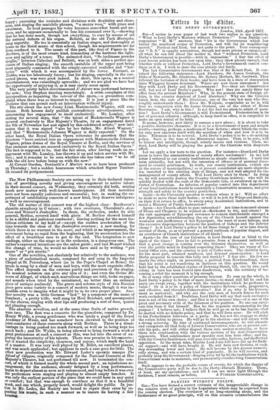The New Philharmonic Society are acting up to their declared
inten- tion of providing novelty and giving encouragement to native talent. In their second concert, on Wednesday, they certainly did both, mixing much new matter with well-known masterpieces. All their novelties have not been equally judicious and successful ; but, in making the ex- periment of establishing concerts of a new kind, they deserve indulgence as wen as encouragement.
The old matter of this concert was of the highest class : Beethoven's gigantic symphony in C minor ; with two overtures, Cherubini's Ana- creon and Mozart's Zauberjnite. In these, the orchestra, under its able general, Berlioz, covered itself with glory. M. Berlioz showed himself to be a skilful and judicious conductor ; leaving nothing for the most fas-
tidious criticism to lay hold of—except the sudden acceleration of the time towards the close of the ZauberfAite overture ; a new reading, for which there is no warrant in the score, and which is no improvement, the movement being so rapid from the beginning, that its acceleration has the effect of a breathless race to get to the end. The temptation to new readings, either on the stage or in the orchestra, is a dangerous one. The author's expressed intentions are the safest guide ; and had Mozart wished this change of time, he would no doubt have said so by writing "pits mosso " or " pits stretto."
One of the novelties, not absolutely but relatively to the audience, was a piece of ecclesiastical music, composed for and sung in the Imperial Chapel at St. Petersburg, where (as in the Pope's Chapel at Rome) the music is sung by a choir of men and boys, with the moat exquisite effect. This effect depends on the extreme purity and precision of the singing. No musical notation can give any idea of it; and even the divine Mi- serere of Allegri, of which such marvellous things are told, looks on paper, and sounds when tried by the uninitiated, no better than an ordinary piece of antique psalmody. The grave and solemn style of this Russian piece gave some variety to a concert of modern music, though it was im- possible even to imagine what it might be in its own proper place. Ano- ther novelty was a little German "lied" by a composer of the name of Gumbert ; a pretty trifle, well sung by Herr Reichert, and accompanied by the chorus, singing with abut lips and producing a sort of hum, quaint and pleasing enough. The absolute novelties, and at the same time fruits of native growth, were two. The first was a concerto for the pianoforte, composed by Dr. Henry Wylde, a young gentleman who was lately a pupil of the Royal Academy of Music, and has somehow been elevated to the position of joint-conductor of these concerts along with Berlioz. There is a disad- vantage in being pushed too much forward, as well as in being kept too much back ; and Dr. Wylde, in being allowed to bring forward a work of great pretensions at such a concert as this, was led into the error of ex- posing the immaturity of his talents. There was promise in his concerto ; but it wanted the simplicity, clearness, and repose, which mark the hand of a master. It was very well played by M. Billet, an excellent pianist, and was much applauded ; but applause in such a case goes for little. The other new production was Mr. Edward Loder's operatic masque The Island of Calypso, originally composed for the National Concerts at Her Majesty's Theatre, but not performed till now. It terminated the con- cert, of which it formed nearly the whole second part ; an injudicious ar- rangement, for the audience, already fatigued by a long performance, began to depart almost as soon as it commenced, and long before it was over the performers were singing and playing to almost empty benches. It was only the earliest portion of the piece that we could hear in any quiet or comfort; but that was enough to convince us that it is a beautiful work, and one which, properly heard, would delight the public. In jus- tice to Mr. Lode; the Society are bound to repair their error by re- ?eatapg his music, in such a manner as to insure its having a fair hearing.


























 Previous page
Previous page